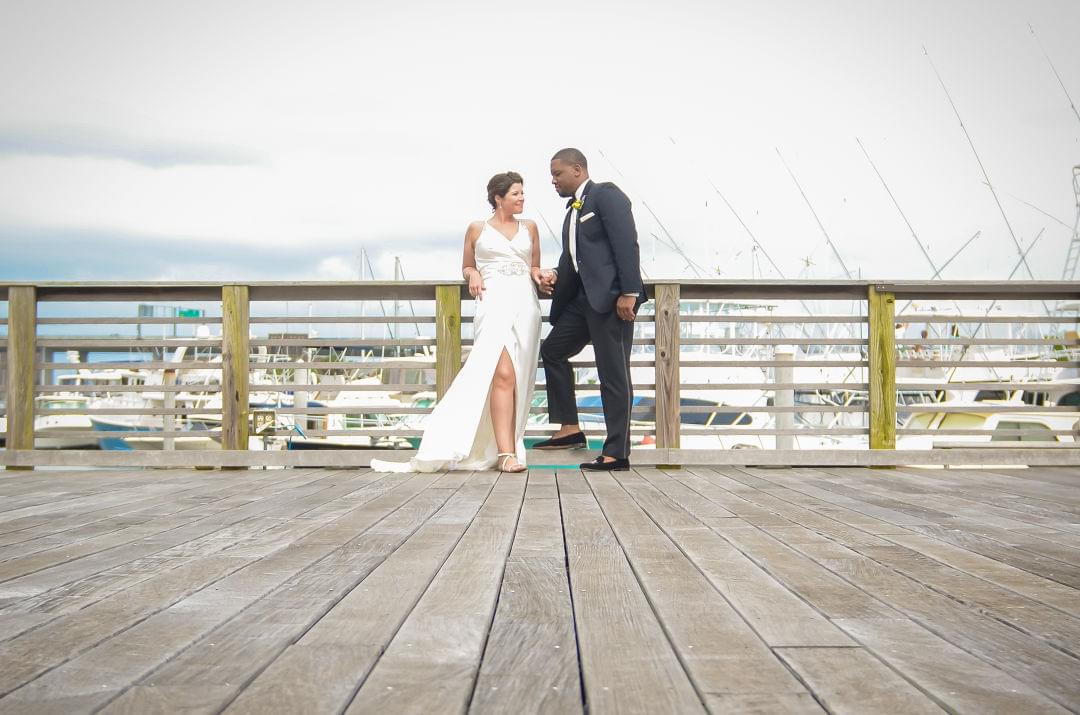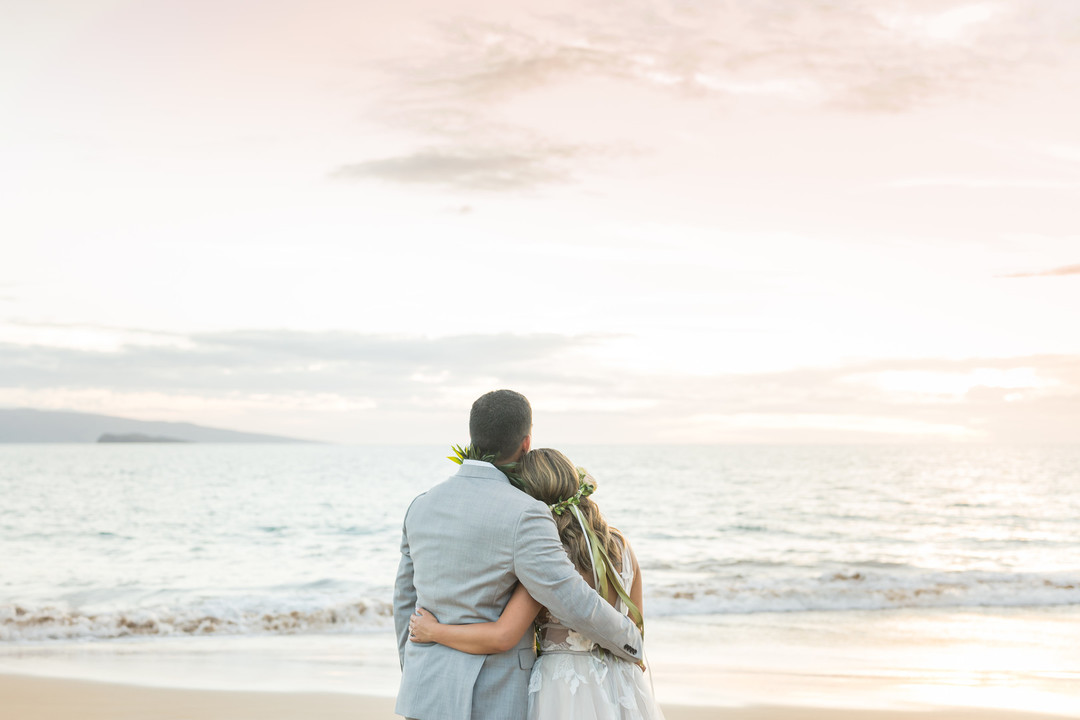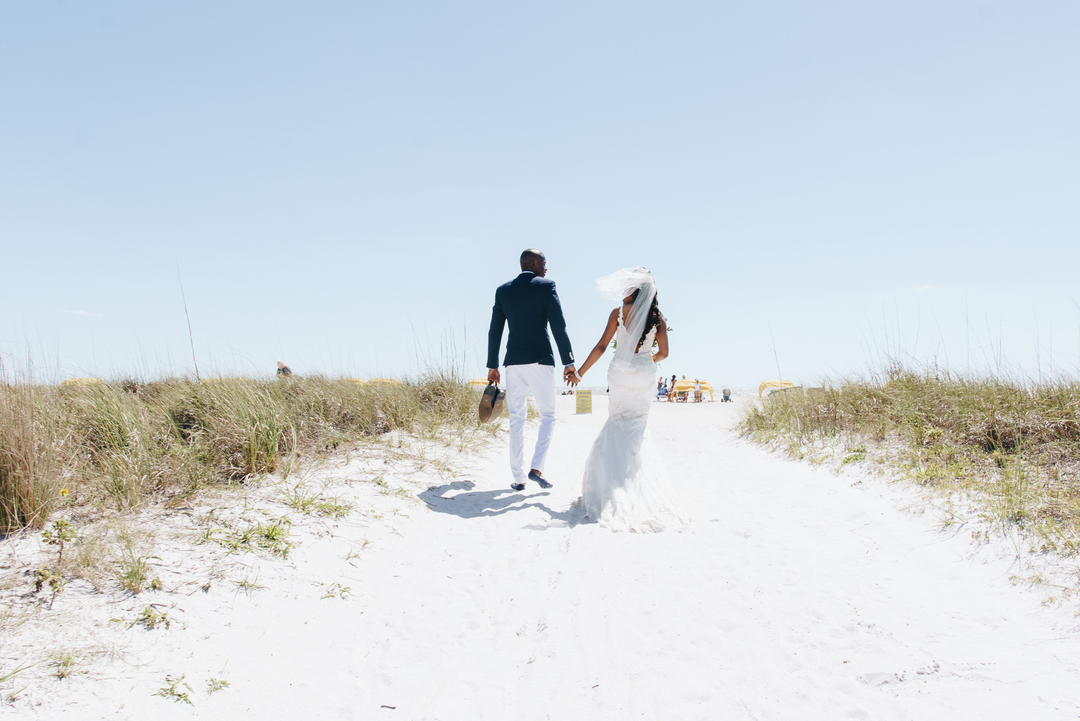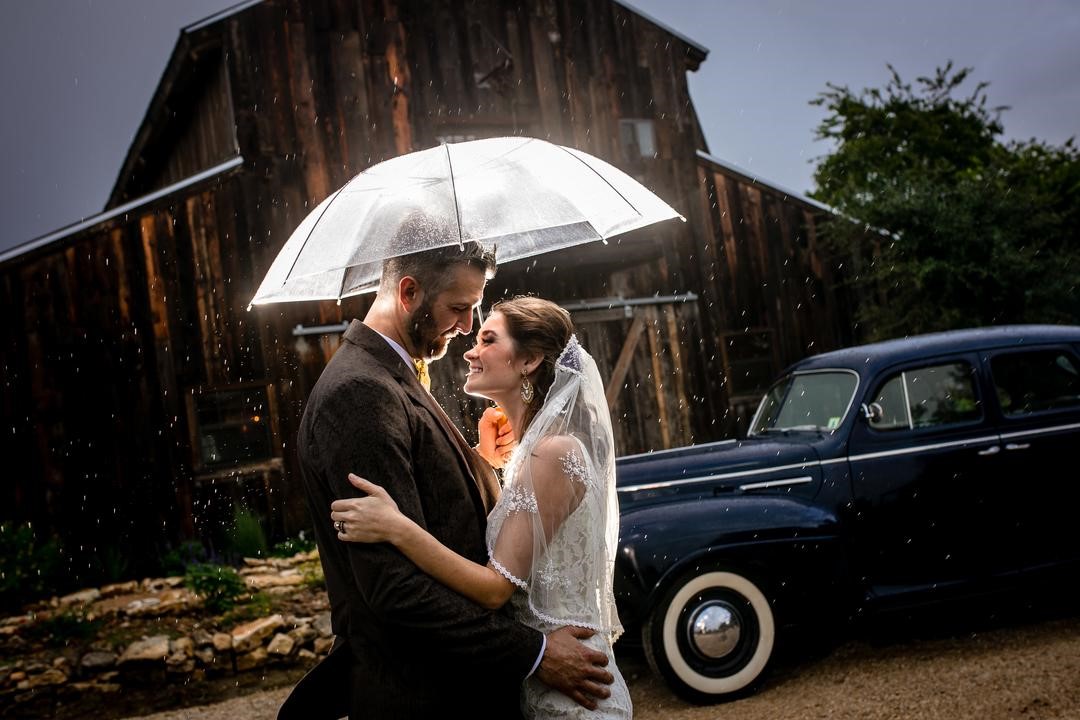- Expert advice/
- Honeymoons/
- Honeymoon planning/
- How to Plan a Honeymoon Around Hurricane Season
- Honeymoon planning
How to Plan a Honeymoon Around Hurricane Season
Hurricanes aren't so uncommon anymore. Plan your honeymoon around hurricane season with these expert tips.
Last updated October 13, 2025

Three words: beach and chill. If escaping to a luxurious beachfront destination sounds exactly the right honeymoon to you, you’re not alone. The whole ‘no shoes, no shirt, no problem’ concept isn’t lost on many. Beach destinations are some of the most popular for honeymoons year after year. However, hitting the coast can have its setbacks—no, not sunburn. Hurricanes: common, but serious storms that occur with increasing regularity thanks to gradual shifts in our climate. While it’s statistically unlikely that a hurricane will interfere with your honeymoon, it’s important to know the risks and precautions as you plan.
If you’re planning or already planned a beach and chill honeymoon in a potential hurricane zone, read on. Here is your complete guide to planning a wedding during hurricane season.
What You Need to Know About Hurricanes
Unless you’ve grown up along the coast or near the hurricane belt (a nickname given to a particular area in the Atlantic Ocean heavy with regular hurricanes), you may not know how a hurricane can develop and evolve. Before booking a beachy honeymoon, get to know the ins and outs of hurricane lingo and behavior.
What categorizes a storm as a hurricane?
Hurricanes begin as tropical disturbances created when rain clouds compile over bodies of warm water. These clouds can intensify to create a tropical depression, tropical storm, and eventually escalate into a hurricane. According to NASA, hurricanes are broken up into five categories, each elevating in severity of mph wind gust. You’ve probably heard “category 4 storm,” for example. Category 1 starts at 74 mph.
Where do hurricanes hit?
Typically, hurricanes occur by/in the Carribean, Gulf of Mexico, and southern east coast of the US. However, technically the hurricane belt runs as a boomerang from the northwest African coast across the Atlantic ocean to the Eastern Coast of the United States and the Caribbean, following back up across the Atlantic to northern Europe (Azores, Ireland, UK, and Iceland).
When is hurricane season?
Hurricane season starts June 1st and ends November 30th. August, September, and October are the peak months for hurricane activity. If you can, it’s best to avoid traveling to coastal locations near the hurricane belt during these months.

How To Avoid A Hurricane On Your Honeymoon
If it feels impossible to avoid locations with hurricane regularity (or if you’ve always wanted to honeymoon in the Caribbean, for example), so be it. But plan and book your trip smart.
Book inland.
If you and your partner plan to book your honeymoon between the months of June and November, try to book a location more inland and not directly on the beach. Many coastal towns or cities have inland resorts or hotels that provide shuttles to and from the coast. The further away from the coast, the less likely you’ll have to evacuate in a hurricane.
Try these islands.
Good news: There are islands that technically aren’t part of the hurricane belt. Visit the inhabited Caribbean islands to ensure safety from hurricanes. These include Barbados, Saint Vincent and the Grenadines, Grenada, Trinidad and Tobago, Bonaire, Curaçao, Aruba, Providencia Island, and the San Andrés.
Avoid booking during hurricane season.
If you’re dying to hit a location near the hurricane belt, that’s OK. Just push the honeymoon out of peak hurricane season. Simple enough if your schedules allow.
Have a plan B.
If there’s no extra cost, what’s the harm of a backup plan? We know planning a honeymoon, in general, isn’t the easiest thing. Most people are limited by PTO days, blackout days at work, or other schedules that are relatively inflexible. If you can, though, develop some kind of backup plan that you can lean on. Many travel experts recommend booking through companies with zero-cancellation policy hotels that require (only) 48 hours notice to cancel or change.
Flights are certainly a different story, but it’s not impossible to score deals on last-minute flights. Ideally, your backup location has regular or direct flights from your local airport.
Purchase travel insurance.
Travelers insurance is a great tool to secure your funds when your travel plans change out of your control. Whether it’s through the airline, hotel, or a third-party vendor, purchasing traveler’s insurance guarantees your money back in case of an emergency (like, say, a hurricane).
What To Do If You Already Booked
If you’ve already planned (and booked) your honeymoon somewhere on the belt during hurricane season, don’t worry! Again, it’s statistically unlikely that a hurricane will third-wheel your honeymoon. However, knowledge is power and thanks to modern technology, you can stay as informed as possible and foresee projections. Here’s what you need to know.
Check the forecast.
It may sound obvious, but many couples leave for their honeymoon the day after their wedding. In the beautiful chaos of getting a wedding ceremony and reception together, checking the weather for your honeymoon location may fall to the wayside. Try to keep an eye on the weather for your destination for two weeks ahead of your departure. Alternatively, ask a friend or family member to watch it for you if you’re busy getting last-minute wedding details together. Typically meteorologists can predict a storm path a week in advance.
Understand the parameters for cancelations.
If you booked without securing travel insurance, you may still be in the clear if a hurricane is projected to hit. Some airlines or resorts have guidelines in place that provide refunds or rebookings when faced with natural disasters. Contact each and see how they handle these logistical matters a few weeks before you’re scheduled to leave.
Is there a sister property elsewhere?
If you’re unable to get a full refund, some resorts may transfer your stay or credit to a sister property in another location. This is an adventurous turn of events for a honeymoon, as you may get to visit a surprise location. Additionally, airlines may transfer your flight to a new location, especially if they can’t fly into a specific area due to a storm.
Make the call.
Meteorologists and weather experts can only predict where and when a storm is going to hit. If it looks like a storm is about to hit your honeymoon location, you and your partner need to make the call on whether or not to risk it and go, or stay local and cancel.
Secure traveler’s health insurance.
Whether you’re traveling to the hurricane belt in-season or off, having traveler’s health insurance every time you visit a new place is crucial. For a severe storm like a hurricane, you never know what may happen, so be prepared with coverage or emergency retrieval funds. It can be a life-saving step.
Call your credit card company.
Did you know that your credit card may have travel benefits? For example, some companies provide you with cancelation fee coverage or international health insurance. Additionally, your credit card may come with a concierge service that has access to information that you may need when a hurricane is approaching your honeymoon destination.

What To Do If A Hurricane Is Coming
Some locations (like Bermuda or the Azores) can have as little as two days notice before a storm makes landfall. So, if you’re already on-site in a place like this, you need to be prepared. First and foremost, don’t panic! With planned guidance from officials in the area and prior knowledge, you can stay safe.
Find a way back home.
As soon as you get word of hurricane landfall, look into transportation services out of the impacted area. While a direct flight home would be the ideal situation, remember that your priority is safety and not comfort. If there are only flights left to another safe location, book those and worry about getting home later.
Locate emergency services.
On the off chance you can’t get out of the hurricane’s path, contact the nearest embassy or consulate in that country. They’ll have a system set in place for the safety of their citizens. Additionally, premium travel credit cards or international insurance programs have concierges set in place to assist you in manners such as these.
Learn the hotel or resort’s response system.
It’s extremely likely that your hotel or resort has established and practiced responses to a severe storm like a hurricane (particularly if they’re located on the hurricane belt). Learn and listen to your hotel staff for potential next steps.
Be respectful.
Remember, while it may seem like a vacation to you, you’re visiting another person’s home. Whether you’re being instructed by the hotel staff or an emergency response team, these are human beings trying to help you with storm care. It absolutely sucks that your honeymoon is being sidetracked by a hurricane, but it also sucks for everyone else involved, especially if their homes or families are in danger. Be mindful of these realities and keep your cool.
Prepare for yourself.
Yes, it’s crucial to listen to the advice and knowledge of your resort staff or emergency response team. However, you and your partner are solely responsible for your welfare. Before the storm hits, make sure to have access to bottled water, sustainable food, and external batteries.
Preparation is everything when it comes to planning a honeymoon during hurricane season. It’s unlikely that a hurricane will make landfall during your getaway, but there’s still a chance that it could happen. Give your itinerary the extra padding—and your mind the proper knowledge. You and your partner are sure to have one incredible honeymoon, storm or no storm.
Up next for you

Average Honeymoon Cost: Breakdown & Smart Budgeting Tips
How-To
Average honeymoon cost is $5,300 per couple; see how destination, trip length, and season shape your spending and get planning tips to stay within budget.

Destination Wedding Cost + Tips to Cut Costs
Inspiration
Average honeymoon cost is $5,300 per couple; see how destination, trip length, and season shape your spending and get planning tips to stay within budget.

10 Things You Should Do as a Newlywed
List
From financial planning and taxes to insurance and legal documents, follow this 10-step list to help you get your newlywed life up and running smoothly in no time.

3 Tax Changes Newlyweds Need to Make
Inspiration
Now that your married, your taxes will change. Get started and keep it simple with our top three tax tips for newlyweds.
Featured

5 Finance Topics Newlyweds Need to Discuss Post-Wedding
Inspiration
Finances aren't always the most fun to talk about—but they are necessary, especially for newlyweds. Find out what newlywed finance talks to focus on and how to make the money talk feel easier.

5 Tips For Newlyweds Buying Their First Car
Finances
Your little coupe or well-traveled truck might have been perfect for your single life. But after you say “I do,” you and your partner might be ready for a car that fits both your needs—and your future family’s, too.

Are You Ready For A Joint Bank Account?
Finances
To learn how to save money together for the future, read these expert tips on merging finances with your spending-partner-for-life.

Best Ways To Start Saving For Your First Home Together
Finances
The thank-you notes are mailed, the honeymoon is over, and you and your partner are finally starting your lives together. Buying your first home is a major hurdle, but with some smart planning, you can land the home of your dreams and stay within your budget.
- Expert advice/
- Honeymoons/
- Honeymoon planning/
- How to Plan a Honeymoon Around Hurricane Season
Find even more wedding ideas, inspo, tips, and tricks
We’ve got wedding planning advice on everything from save the dates to wedding cakes.
